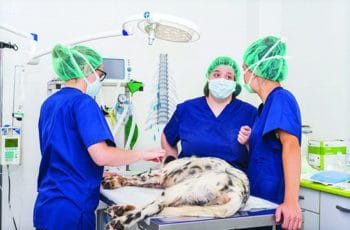Here’s an actual email exchange I just had with a young man who went to high school with my son:
Hi Nancy,
First off, sorry for the out-of-nowhere email 🙂 I’m a high school friend of [E, your son] and a close friend of [S, your son’s friend, who adopted a dog from your local shelter with your help about two years ago]. S passed along your email address.
I recently had the good luck of a stray Husky giving birth to puppies in my front yard. They’re 8 weeks along now and ready to find forever homes, but I haven’t had luck in my social network and worry about passing them off to a shelter. I’ve heard you’re well connected in this area – any suggestions on where/how to start? Many thanks in advance!
– T.S.

Hey T,
First, good on you for taking in the mom and raising the babies. How many are there?
I understand your reluctance to consider a shelter for placing the puppies, but from my view, often a shelter is the best place for puppies, because they will be vaccinated and microchipped, but most importantly, receive spay/neuter surgery before getting placed in a home. Most shelters today can get all that done for only about $100- $200 per puppy, whereas, when an individual takes them home and makes their own appointment for the same surgery, they will most likely be told they need to wait 6 months to a year, and then charged anywhere from $200 for a male to be neutered to up to $600 (or more) for females for spay surgery. (The bigger the dog, the more likely the owner will be told to wait before surgery, and the price gets quoted on the dog’s weight). What this often means is that dogs who are given away rarely get spayed or neutered; people who take home a “free” pup balk at that cost, and then, 7 months or a year later, guess what? More “free puppies”!
Most shelters today hire vets (or have one on staff) who can do many more surgeries in a day than a vet in a mixed practice can do, and at a much lower cost. It’s also state law in California that all dogs and cats must be spayed/neutered before adoption, so shelters have to find a way to make that happen.
Shelters also screen their applicants, making sure that people have fenced yards or other basics.
The big problem is, ALL of the west coast shelters are struggling with an overabundance of Huskies and Husky-mixes at the moment. Huskies are notoriously high-energy dogs – there is a reason they are the chosen breed to pull sleds! – and their coats require owners who are committed to living with a lot of loose dog hair floating around their homes and cars. As you now know, they are among the cutest puppies ever, but they grow into very smart dogs who are motivated to MOVE and RUN and CHEW! They work overtime as adolescents to have fun – which often translates into some of the highest rates of “owner-surrenders” back to shelters. Many people can’t handle their energy and struggle to keep them exercised, and they turn into champion escapees, climbing fences, chewing their way through gates, and digging under barriers of all kinds – which is probably how you found the mama on your lawn. But what this means is, you might have trouble finding a shelter that will take them, because they might already have a number of untrained, unruly adolescent and adult Huskies they are trying to find homes for.
On the other hand, shelters know that it’s far better for the community to spay/neuter puppies and get them placed in screened homes than to allow them to be given away and likely not get neutered. And puppies tend to get adopted more quickly than adolescents or adults — so if you can find a shelter that WILL take them, that would be ideal (in my view). However, many shelters are so full right now that they are not taking “owner-surrendered” dogs. (My local shelter is not taking dogs from owners right now; they barely have enough room for all the strays that their officers are picking up.)
Less ideal, from your view, is that if you can find a shelter who will take them, the shelter is likely to charge a fee for “owner-surrendered” dogs; it helps defray the cost of those vaccines, microchips, and spay/neuter surgery, not to mention the highly possible cost of having to keep them for weeks and weeks before they get adopted. (Why “weeks and weeks”? Most shelters have perennial cases of “kennel cough” that puppies are likely to catch upon admittance, which means they will be held back from the public for at least a week and sometimes as much as three weeks while being treated for their runny, snotty noses and deep coughs, which can sometimes turn into a more serious illness, especially in a shelter setting. This is rarely fatal, but the pups will be growing older and larger while waiting to recover from their cough; no one wants to take home a puppy with a scary cough!)
I know they aren’t “your” dogs — so why should you have to pay an “owner-surrender” fee? Well, in your case it’s true – you were being a good Samaritan – but you should know that “we found these puppies” is what 99% of people who bring puppies to shelters for surrendering say. I’ve heard, “I came home from work and heard puppies under my deck, the mom had them under there, and I’ve never seen her before!” and “We found them all dumped by our mailbox! (or “in a ditch by the side of the road”) more times than I can count. And the fact is, the shelter will be spending more on each pup then they get back in adoption fees – that’s why they are constantly fund-raising – and even a fairly stiff owner-surrender fee often barely covers the cost of caring for each pup.
I’m not sure what town you’re in, but most of the Bay area shelters are pretty darn reputable, and if you can find one that will agree to take them, that might be your best bet, and ultimately what’s best for them. You can also ask any shelter you call if they know of any rescue groups who might take puppies. Rescue groups generally take on only as many dogs as they can afford to care for and place; they don’t have the burden of having to take in all the strays of municipal shelters.
But if you can’t find one, you’re back at square one: Marketing on social media to friends and family and their friends and family. Your cute pics will help – as will any vaccinations you’ve obtained for them. Make your photo albums shareable, and try to get them placed ASAP, because they rapidly lose their adorableness as they approach 3 and 4 months, and are missing out on puppy socialization and bonding with their new families.
Sorry if this sounds kind of discouraging. You are the second person in two weeks to ask me this same question – and my own local shelter (where I volunteer) is so full, they’ve been waiving all adoption fees, trying to get dogs and puppies placed at a faster rate than more keep coming in. The staff is exhausted! They’ve been DROWNING in puppies – most likely because since COVID, many vets have had long waiting times for appointments, and dogs have been getting pregnant before people knew they COULD get pregnant. And we’re several canine generations into that cycle at this point.
Good luck — and again, thanks for taking this on. I know it’s a burden!
NK


